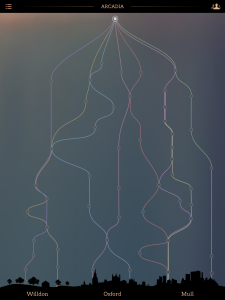Arcadia by Iain Pears was released in the UK in September 2015 and has now had its North American release on February 9th 2016. The novel takes place over a series of timelines and from a variety of perspectives, so much so that there is an Arcadia iOS and Android App to help readers deep track of the various plot lines.
The novel takes place over a series of timelines and from a variety of perspectives, so much so that there is an Arcadia iOS and Android App to help readers deep track of the various plot lines.
I particularly enjoy novels written from multiple perspectives, and Arcadia did not disappoint. The “trunk” of the narrative tree takes place in the 1960s in Oxford, England. From there it branches into a three alternative futures. Each of the those timelines have chapters from the perspective of various characters within them. Scientist and psychomathematician, Angela Meerson, is the character on which all three timelines hinge. She has been conducting experiments involving time travel that most of her colleagues interpret as multiverse travel. It’s her tests that result in disruptions in the other timelines.
The connections between plot lines start becoming apparent about one-fourth of the way through the novel, but the actual implications of what is happening take longer to surface. The reasons behind Angela Meerson’s experiments and the urgency behind her time travel discovery, for example, are only brought to light near the end of the novel.

The Arcadia app is an interesting addition to the reading experience, but I take one issue with it: the app is not exhaustive unless paid for. Unlocking the whole novel in the app is $3.99. Normally I wouldn’t think anything of this, but if I’ve already paid for a copy of the novel I wouldn’t want to pay again for the supplementary app. However, when unlocked, one can read the entire novel in the app, but not in the same order as the print or e-book. The app allows the reader to follow a single story line at a time rather than the story lines being interspersed as they are in the original novel itself.
I would not recommend Arcadia for regular readers of fantasy, but the unique structure and variety of the narratives make it more an interesting read for those who enjoy historical fiction or alternative histories. The ordering system my library uses has categorized Arcadia as a Young Adult novel, but the only reason I can see for that classification is one of the plot lines centers around a 15-year-old girl who gets caught up in Angela Meerson’s experiments. Overall, the concepts behind the novel are interesting and keep the reader curious but it does take awhile for the connections between characters and timelines to begin making sense.

